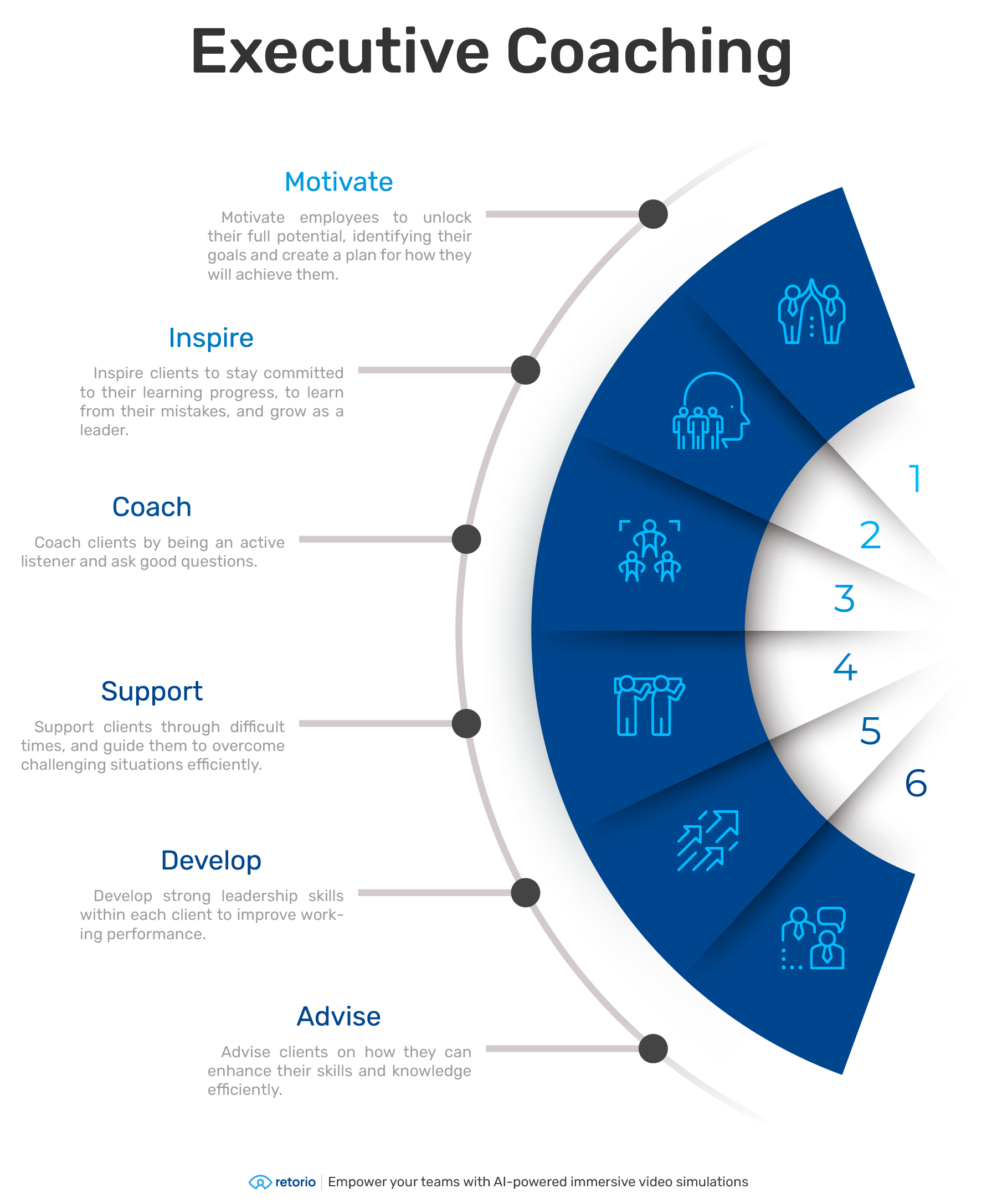Approximately 25% to 40% of all Fortune 500 companies invest in executive coaching for their leaders, and demand is estimated to reach $11.2B this year.
 In fact, Goldman Sachs believes in executive coaching so much that they speak to their coaching commitment on their website.
In fact, Goldman Sachs believes in executive coaching so much that they speak to their coaching commitment on their website.
So what's the ROI on executive coaching? What does it exactly look like and what does an executive coach do? According to Brainz, executive coaching leads to the following:
|
Coaching impacts |
Bottom Line Impacts |
| Improved relationships with direct reports, peers, and other stakeholders | Increased revenue |
|
Increased commitment to the organization |
Increased productivity |
|
Increased job satisfaction |
Higher customer satisfaction |
In this article, we delve deeper into what exactly executive coaching is, why its importance is rapidly growing, and how to integrate an executive coach into your business strategy.
What's in this post?
- What is executive coaching?
- Why is executive coaching so important?
- What are executive coaching topics?
- How is AI being used for executive coaching?
What is executive coaching?
Executive coaching creates a collaborative alliance between seasoned coaches and executives which fosters professional and personal development and success. The goal of executive coaching is to identify and achieve specific goals through targeted strategies and ultimately help executives and leaders build the necessary skills to help them lead, including:
- Build leadership skills
- Create career plans
- Enumerate personal beliefs
- Identify short-and long-term career goals
- Strengthen decision-making skills
- Develop strategies to improve performance
- Build self-confidence
Effective leaders prioritize their personal development with the same level of dedication as their professional growth and executive coaching plays a role in bridging the gap between these two areas.

Why is executive coaching so important?
To get straight to the point, here's the brief answer: an executive's performance has a ripple effect on the entire organization.
And the influence of leaders is more impactful today than it ever was before.
Described as the VUCA world, meaning a world that is full of volatility, uncertainty, complexity, and ambiguity, organizations are facing increased competition, changing regulations, and reduced budgets, just to name a few shifts.
This post-pandemic age means executives and leaders must abandon old styles of leadership and focus on empowerment in order to fulfill everyone’s potential, including their own.
“Employee wants and needs have changed, and leadership needs to keep pace with it.”
Jean-Michel Chopin, Managing Director at StratX ExL

Even prior to the emergence of Covid-19, we were already facing a series of disruptions, with organizations experiencing the impact of Digital Giants like Google, Apple, Facebook, and Amazon entering the scene and pushing the boundaries of traditional business models.
Through effective coaching, executives can develop the necessary competencies to navigate complex and uncertain business environments with confidence, make informed decisions, and achieve strategic objectives.
Moreover, executive coaching facilitates a growth mindset and fosters a culture of continuous learning throughout an organization.
That's right - not only is executive coaching worthwhile, but essential, for any organization seeking to achieve long-term success and competitive advantage in today's dynamic and challenging business landscape.
An executive coach is also essential for ensuring that executives have the skills and resources they need to lead their teams effectively.
By providing tailored guidance and support, an executive coach can help executives stay on track with their development goals and ensure that they are equipped to handle the responsibilities of their roles.

So how can bad leadership coaching efforts affect an organization's performance? What happens when organizations don't invest in coaching sessions?
Studies have found that when organizations do not invest in executive coaching, their sales and profit margins decrease.
For example, a McKinsey & Company study of more than 1,000 companies showed that those with good leadership development programs had significantly higher profits and returns on investment compared to those without such initiatives.
This shows that investing in quality executive coaching can lead to greater success and higher profits.
Especially as we experience a VUCA business landscape, it's a top priority for leaders to stay on track with their development goals, build their skill set, and increase their confidence in the workplace. Through tailored guidance and support, executive coaches can help executives understand the expectations of their roles and provide them with the tools they need to succeed.
What are executive coaching topics?
Executive coaching topics typically include: developing leadership skills to lead a team, improving communication abilities, enhancing decision-making capabilities, and driving strategic business objectives.
Of course, different executives have unique challenges that can be addressed through executive coaching tailored to meet individual needs.
Here is a list of the top executive coaching topics that executive leaders should develop in a VUCA environment:
1. Emotional intelligence:
Studies have proven a significant correlation between leadership and emotional intelligence. Emotional intelligence is a key component of a successful executive as it enables leaders to understand, manage, and direct their emotions and those of others on the team. Highly effective executives possess the ability to interpret emotions accurately, use emotional information to guide behavior, stay in control of their own emotions, and demonstrate empathy for others.
2. Communication skills:
Strong communication skills are essential for any executive. They help build relationships with colleagues, support team-building, and ensure that corporate goals are met. Executives must be able to craft powerful messages that inspire their teams and lead them in the right direction. As well as clear verbal communication, executives need to be able to listen actively to understand all points of view before making decisions.
3. Leadership development:
Leadership development is another key area for any executive. Executives need to be able to create strategic plans and lead their teams in the most efficient way possible. This means they must have an understanding of how to manage people, motivate staff, delegate tasks effectively, and build strong relationships with all stakeholders.
4. Change management:
Change management is also essential for executives today. In a rapidly changing environment, being able to lead through transformation and create an adaptive culture are essential skills that every executive must have. AI coaching can help executives understand when it’s time to embrace change, how to facilitate the process of transition, and be effective in leading their teams through disruption.
5. Time management:
Time management is also an important ability for executives. As a leader, being able to plan ahead and prioritize tasks according to importance is essential in order to be successful. AI coaching can help executives improve their time management skills by providing visibility into how they are spending their time and suggesting areas of improvement based on individual preferences.

How is AI being used for executive coaching?
AI coaching can be used to provide personalized, goal-oriented training for executives in various fields of business.
For example, Retorio's AI-based coaching platform is being used to help sales teams become more productive and successful.
The AI coach uses data from every customer interaction to create customized feedback that helps the executive improve their performance. This kind of tailored guidance has proven effective in helping sales teams to increase their sales and improve customer satisfaction. In addition, AI coaching can be used to help executives better understand the needs of their customers, leading to more effective strategies for increasing sales.

AI-based tools can provide more detailed insights into each executive's performance and suggest targeted executive coaching strategies to help them improve their performance.
Want to try out Retorio's Behavioral Intelligence Platform for yourself, and see how your leaders could benefit from its executive coaching platform?
Key Takeaways
- The importance of executive and performance coaching is rapidly growing as the business environment continues to shift. Coaching sessions help executives develop their necessary skills.
- Emotional intelligence is among the key skills executive coaches need to focus on today to lead teams successfully.
- As employers' needs have drastically changed, it's up to L&D managers to make sure executives keep up to pace with these changes.
FAQs for executive coaching
What makes a person a leader is still debated, but according to Bennis (1994) all leaders seem to share some common traits. Factors such as experience, personality, and organizational culture shape an individual's approach to guiding teams and organizations, however, certain leadership styles are more commonly used than others in the workplace. In 1939, Kurt Lewin and his team of researchers identified three distinct approaches to leadership, which are:
- Autocratic: Autocratic leadership is a style of leadership where the leader has complete control over decision-making, with little to no input from subordinates. In this style, the leader makes decisions based on their own ideas and judgments, without consulting their teams. Autocratic leaders tend to be directive, with a focus on maintaining strict control and authority over their team. This style of leadership can be effective in situations where quick and decisive decision-making is needed, but it can also lead to a lack of employee engagement and morale. Today, examples of leaders who prefer this style of leadership include Green Bay Packers coach Vince Lombardi, Standard Oil founder John D. Rockefeller Sr., and U.S. President Richard M. Nixon.
- Participative: Also called “democratic leaders," those who employ this approach usually involve their followers in the decision-making process by encouraging participation from and delegating authority to their team. Many U.S. presidents stand as living examples of the democratic/participative leadership style, including Abraham Lincoln, Jimmy Carter, and John F. Kennedy.
- Delegative: Delegative leadership style, also known as laissez-faire or free-rein leadership, is a leadership approach in which the leader grants their subordinates a high degree of autonomy in decision-making and task execution. In this style, the leader gives subordinates the freedom to work independently and make decisions without much supervision or direction. This approach works best when team members are highly skilled, self-motivated, and experienced in their field. Delegative leaders tend to provide little guidance or direction, and they trust their subordinates to make the right decisions and execute their work effectively. This leadership style can be beneficial in promoting creativity and innovation, but it can also lead to a lack of structure and direction, resulting in potential confusion or lack of coordination among team members. Examples of delegation leaders include Steve Jobs and Warren Buffet.
Executive coaching is an invaluable tool for helping leaders to develop and hone their leadership skills.
This style of professional development involves a coach, or mentor, working one-on-one with a leader to assess their strengths and weaknesses, identify areas where they need to improve, and provide advice on how best to lead the organization and manage their team.
Executive coaching can help leaders to develop better communication skills, motivate their team more effectively, and build relationships with key stakeholders. It also helps leaders to gain a deeper understanding of their organization's culture and values, enabling them to make informed decisions that are in line with the organization’s mission.
oday, executive coaching, as well as general L&D is not about annual workshops and lectures. Top organizations that are competing in the VUCA business landscape today understand that executive coaching needs to be available for leaders 24/7, and not restricted to place or time.
Executive coaching, can yield the following benefits:
- Improved Skills and Knowledge: Executive coaching ensures training programs address current and future skill needs, helping leaders stay ahead of industry trends and technological advancements.
- Increased Productivity: Training is linked to improvements in productivity.
- Enhanced Employee Engagement: Executive coaching can increase employee engagement and satisfaction.
- Better Team Performance: Leadership development programs can improve team performance metrics.
- Higher Sales and Revenue: Effective executive coaching can lead to increased sales and quota achievement.
- Greater Customer Satisfaction: Enhanced leadership skills can improve customer satisfaction.
- Cost Savings: Strong leadership can lead to cost savings through increased efficiency and reduced employee turnover.
- Better NPS (Net Promoter Score): Improvements in operational metrics like NPS can reflect better leadership.
To fully realize the benefits of executive coaching, the sources suggest:
- Aligning Training with Business Goals: Design executive training programs to support the company's strategic objectives and KPIs.
- Demonstrating ROI with Data and Metrics: Use metrics and data to showcase the return on investment (ROI) of training programs.
- Engaging Stakeholders: Involve key stakeholders in the planning and evaluation of training programs to ensure buy-in and relevance.
- Utilizing AI and Data Analytics: Incorporate AI-driven solutions like Retorio to provide quantifiable data on training effectiveness.
- Implementing Robust Measurement Tools: Use advanced analytics to track training outcomes and link them directly to key business metrics.
Factors influencing the duration of an executive coaching program, based on the sources, include:
- Time to See Behavioral Changes: AI coaching data indicates that meaningful initial behavioral improvements can be observed after about three coaching sessions, with learning curves flattening after this point. Continued sessions reinforce these improvements.
- Time to Impact Business KPIs: To observe tangible business outcomes, such as revenue increases or quota attainment, the sources suggest a timeframe of 4-12 months. This implies that the coaching program should last long enough to allow for behavioral changes to translate into measurable business results.
- Onboarding Programs: For new hires, AI coaching as part of structured onboarding programs saw learners engage in an average of 6.68 AI coaching sessions. This suggests that executive coaching as part of onboarding may need at least six sessions to be effective.
- Quick Gains: The sources emphasize achieving "quick gains" by focusing on behaviors that can be impacted in the short term. This suggests that initial phases of executive coaching should target specific, achievable goals to build momentum.
- Ongoing Support and Reinforcement: To ensure knowledge retention and application, it's important to implement follow-up mechanisms such as refresher courses and on-the-job coaching. This implies that executive coaching may involve ongoing support rather than a fixed duration.
- Flexibility and Customization: AI coaching offers flexibility and can be integrated into existing workflows. This suggests that executive coaching programs can be tailored to fit the individual's schedule and needs, which may affect the overall duration.
Considering these points, an effective executive coaching program might involve:
- An initial phase of 3-6 sessions focused on achieving specific behavioral changes and quick wins.
- A longer-term phase of 4-12 months to allow for these changes to translate into measurable business outcomes.
- Ongoing support and refresher sessions to reinforce learning and address new challenges as they arise.
Ultimately, the ideal duration of an executive coaching program will depend on the individual's goals, the organization's objectives, and the specific context in which the coaching is taking place. However, by considering the factors outlined above, it is possible to design a program that is both effective and sustainable.
Here are some examples of executive coaching focuses for different leadership levels:
- C-suite executives (CEOs, CFOs, COOs):
- Strategic Alignment: Ensure training goals align with company KPIs and strategic objectives.
- Vision and Strategy: Coaching can focus on refining the executive's vision, strategic thinking, and ability to articulate a clear direction for the company.
- Stakeholder Engagement: Develop skills in engaging with key stakeholders, including board members, investors, and other executives.
- Decision Making: Enhance decision-making processes, particularly in complex and uncertain situations.
- Change Management: Improve abilities to lead organizational change and foster a culture of innovation.
- Performance Monitoring: Implement robust measurement tools that demonstrate the tangible value of their leadership and training programs.
- Communication Skills: Focus on leadership communication skills training.
- Success Measurement: Identify how success can be measured afterwards.
- Senior managers transitioning into executive roles:
- Leadership Skills: Focus on developing leadership skills at all levels.
- Transition Management: Training should help senior managers adapt to new responsibilities, build confidence, and manage increased pressure.
- Team Leadership: Enable teams to work better. Get the team to achieve goals.
- Communication and Influence: Improve skills in communicating with and influencing a broader range of stakeholders.
- Strategic Thinking: Develop a strategic perspective and the ability to contribute to long-term planning.
- Decision-Making: Enhance decision-making capabilities to handle more complex and high-impact choices.
- Prioritization: Planning and prioritizing of initiatives.
- High-potential leaders preparing for greater responsibilities:
- Emerging Leaders Training: Undirect match Emerging leaders training Head of L&D, Trainer Consideration Narrowing down options based on specific needs.
- Succession Planning: Identify and nurture future leaders within the company.
- Strategic Thinking: Develop a deeper understanding of the company's strategic goals and how to contribute to them.
- Communication Skills: Improve communication skills to effectively convey ideas and inspire teams.
- Delegation and Empowerment: Learn how to delegate effectively and empower team members.
- Problem-Solving: Enhance problem-solving skills to address complex challenges.
- Founders and entrepreneurs scaling their businesses:
- Leadership Skills: Leadership skills training.
- Scaling Strategies: Training on strategies for scaling the business, including operational efficiency, team building, and financial management.
- Financial Acumen: Develop a strong understanding of financial principles and how to manage growth.
- Talent Acquisition: Improve skills in attracting and retaining top talent.
- Market Expansion: Training on market expansion strategies and how to navigate new markets.
- Risk Management: Enhance abilities to identify and mitigate risks associated with rapid growth.
- Aligning training results with business metrics and synchronize them with company goals and strategic objectives.
To create effective programs, consider the following:
- Personalized Feedback: Personalized feedback and advise (like a mentor) based on insights of thousands of top performers.
- Confidential Environment: Gain confidence in a psychologically safe setting.
- Real-time insights and control over necessary actions.
- Scalable reach to all learners.
- Traceability of learning success at behavioral and business level.
- Integration with existing HR and business intelligence systems for a comprehensive view of training effectiveness.
- Address issues of no budget, no people, scalability of the most effective measures, and trainer capacity planning.
By focusing on these areas, organizations can tailor executive coaching programs to meet the specific needs of different leadership roles and drive meaningful business outcomes.



